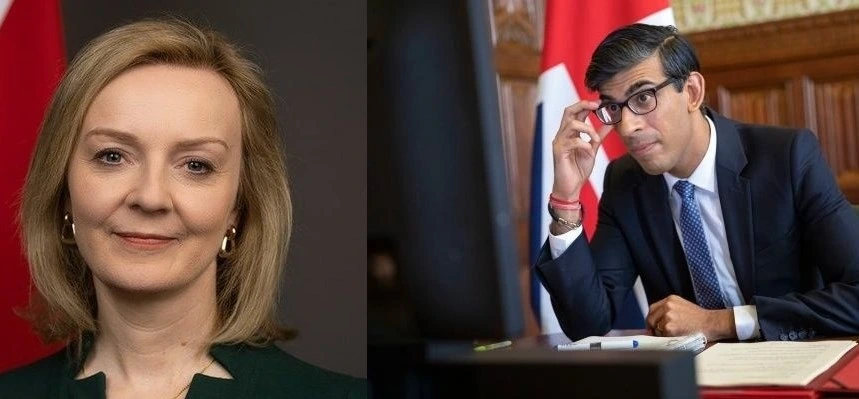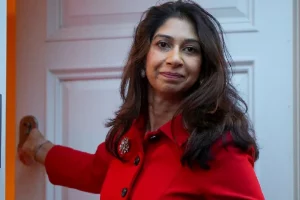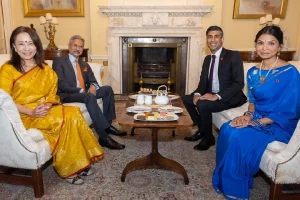With just two contenders in the battle for leadership in the UK's Conservative Party, the campaign pitch is taking sharper tones. The two candidates–Rishi Sunak and Liz Truss, in the running to replace Boris Johnson as the prime minister have spelled out their China policy–keep the UK out of Chinese clutches.
On Sunday and in a series of tweets on Monday, former chancellor Sunak said that China is the "number one threat" to global security and he will close down all the 30 Confucius Institutes in the UK that are teaching Chinese language and spreading that country's culture. Funded by China, the Confucius Institutes operate as soft power centres for the communist country.
1/ China and the Chinese Communist Party represent the largest threat to Britain and the world’s security and prosperity this century.
Read this thread
on how I will face down China. pic.twitter.com/VSD88gfG68
— Rishi Sunak (@RishiSunak) July 25, 2022
Hitting out at the Communist Party of China (CPC), Sunak said in a tweet: "China and the Chinese Communist Party represent the largest threat to Britain and the world’s security and prosperity this century". In a series of tweets on China, Sunak said: "I will build a new international alliance of free nations to tackle Chinese cyber-threats and share best practice in technology security".
He added that in a bid to contain China, he would also utilise the MI5’s–Britain's security agency, to provide greater support to British businesses and universities to counter industrial espionage from China. Sunak said: "We’ll work across government and with security services to build a toolkit to help companies protect their intellectual property".
He added: "And I will work with President Biden and other world leaders to transform the West's resilience to the threat China poses."
Even as he spelt out more possible actions against China, his opponents immediately pounced upon him for being soft on China while he was chancellor of the exchequer and had pushed for stronger economic relations with that country.
His only, and formidable, opponent in the prime ministerial race, Foreign Secretary Liz Truss has been advocating better relations with Taiwan–China's arch foe. Her supporters allege that Sunak has been weak on China while Truss has been mustering the support of European countries to form a NATO-like economic alliance against China.
Let's never forget – I'll never forget – that when I & @hk_watch were threatened by #CCP under #HongKong's draconian #NationalSecurityLaw, @trussliz was one of the first to speak out
I believe in her "Network of Liberty"https://t.co/BDk5tkPvwR
— Benedict Rogers 羅傑斯 (@benedictrogers) July 19, 2022
Truss' supporters say that Sunak's criticism of China is a bid to claw back into the race where opinion polls put the Foreign Secretary comfortably ahead of Sunak among the grassroots members.
Though Sunak has managed to lead the leadership contest all through among the 358 Conservative MPs, the final decision will be taken by the grassroots members of the party who are estimated to vary between 1,40,000 to 2,00,000. Experts believe that these members are most unlikely to follow the voting pattern of their MPs.
The voting will be done through postal ballots whose last date is September 2. The leadership results will be announced on September 5 and the winner takes over as the next prime minister a day later.
Those who knew Margaret Thatcher’s economic policies the best are backing @RishiSunak.
Rishi has the right priorities – tackling inflation, grow the economy and deliver more tax cuts (on top of his big cut in National Insurance this year). @Ready4Rishi #Ready4Rishi pic.twitter.com/ITYMMu3l6t
— Greg Hands (@GregHands) July 25, 2022
The other important issues that the two candidates have spoken about include the contentious but sensitive illegal immigration issue. The party has been under fire from not just human rights groups and the Church but also the European Court of Human Rights for its Rwandan policy–which seeks to deport illegal boat migrants to Rwanda.
Both Sunak and Truss have voiced their support for their party's Rwandan policy under which the UK will fly back illegal migrants coming from France to Rwanda.
Sunak has said that he will fix the UK's broken asylum system and work with French President Emmanuel Macron to resolve the boat migrants coming from France and disrupt traffickers. Truss too has said that she will expand the Rwandan policy to other countries who will accept illegal asylum seekers.
With the contest narrowing down to just Sunak and Truss from a field of 11, their policy pitches to their constituents have become sharper and clearer.
I have a clear vision for our country and economy – and the experience and resolve to deliver it.https://t.co/koPyqw4wIG#lizforleader pic.twitter.com/V9jENJmyj6
— Liz for Leader (@trussliz) July 11, 2022
For Sunak it has been easy to convince the Conservative MPs about his plans and his ability to rein in the 'cost of living crisis' as well as the energy crisis but the uphill task would be to convince the grassroots party membership.
Truss, on the other hand has emerged stronger from the initial number three position to trounce number two contender Minister for International Trade Penny Mordaunt to challenge Sunak. She also has the backing of Prime Minister Boris Johnson, who is alleged to have been running the 'anyone but Rishi campaign'.
Today's televised debate on BBC One could be a game changer as the two competitors try to reach out to the last mile Conservative supporter. The debate is most likely to convince the fence-sitters about the abilities and skills of their would-be prime minister.
Whichever of the two wins, the leadership tussle for the Conservative Party and the country's prime minister will remain a historical election. If Sunak wins, he would go down in history as the first Asian prime minister for the UK while Truss' victory would mean that the Conservatives would have elected their third woman prime minister after Margaret Thatcher and Theresa May.




















